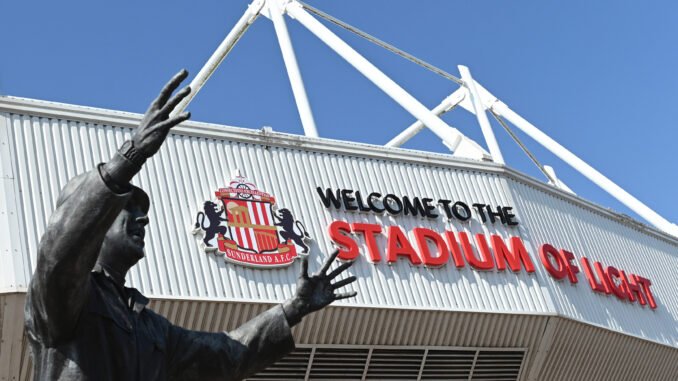
Sunderland’s 1-1 draw with Huddersfield Town on April 18th may not seem like a particularly notable result, but it’s a game that tells a wider table: the last time a Sunderland striker managed to get on the scoresheet in a competitive fixture. Even then, it was one of only three goals for Joe Gelhardt during his half-season loan.
The problem has come into even greater focus this week after Sunderland’s frustration to break down the ten men of Swansea City at the weekend, with Tony Mowbray admitting that his side had suffered from inexperience in the box during a disappointing second half?
So just why are Sunderland struggling so much when it comes to goalscorers – and what can they do to change it?
Though Ross Stewart showed that a striker has the capacity to plunder goals in a team that predominantly plays on the front foot, it is undoubtedly the case that leading the line for Sunderland brings with it some challenges.
This is a side that played for much of last season without an orthodox striker, and so has developed its tactical style accordingly. There is a significant emphasis on the centre forward to lead the team’s press, which is one of the most intense in the division. In possession, there is also an expectation that the striker will be comfortable dropping deep and linking the play, often responsible for working the ball into the areas where wide players can do damage. While all would have liked him to have scored more, Gelhardt’s ability to do both of these things was one of the reasons his place in the side was fairly secure for the second half of last season.
With his current strikers, there have been some challenges when it comes to settling into the role. Mason Burstow is a fine athlete and excellent at pressing, but is adapting to Sunderland’s style in possession having generally looked to spring in behind the defenders during his youth career. Watching Burstow’s clips, Mowbray has noted that many of his goals came from 1-v-1 finishes after beating the opposition defence with his pace and an early run. Nazariy Rusyn is sharp and clearly has the athleticism to press, but is still learning how to do so within Sunderland’s finely-tuned system. And though Luis Hemir showed a goalscoring knack during pre-season, the intensity of the Championship has shown he has much to do to develop his out-of-possession game.
Though Sunderland have struggled to get their strikers on the board, goals more generally have not been a great issue. This is no coincidence, Mowbray has often deployed wide forwards in his managerial career and it is often where a lot of the goals in his side have come from. Jack Clarke, for example, is plundering from a similar position to where Ben Brereton Diaz made his name and eventually earned a move to La Liga.
In fact, this is a trend in football more widely – perhaps a reflection of the way proven penalty-box strikers have become increasingly rare and prohibitively expensive as a result. If you look at the Championship top scorers, half of the current top ten operate either as wingers or attacking midfielders. Even Adam Armstong and Nathan Broadhead, two of the ‘strikers’ on the list, often operate for their sides in slightly wider or more withdrawn roles.
As the table shows, Sunderland are very effective at scoring but often this is when the game is wide open and there is space for Clarke, Roberts et al to thrive. The Swansea City game after the red card more closely reflected many of Sunderland’s home games, where the opposition defenders sit deep and deny the space for those wingers. The need for penalty-box guile is far greater, and it is here that Sunderland have at times been found wanting. While Burstow and Rusyn have shown real promise, they have struggled to create chances against more experienced defenders inside the box.
If experience is the issue – why haven’t Sunderland recruited it?
Stewart’s success marked him out as the exception to the rule when it comes to strikers, a bargain find and arguably the biggest success of Sunderland’s current recruitment team.
Generally, Sunderland without parachute payments and a strict wage budget have found themselves priced out of the market for established strikers. Ellis Simms’ move to Coventry City was instructive, he made a very positive impression at Sunderland but was clearly still a player learning his trade, and yet the fee he commanded was entirely out of Sunderland’s reach. Having scored one in sixteen appearances, you could even argue that Simms shows how there is no such thing as a guaranteed goalscorer anyway. The financial implications of getting an investment of that level wrong for future windows are vast.
It’s also clearly true that strikers command the biggest wages and the highest fee for a reason, as their output can be transformative for any team. It’s a balance that Sunderland need to be able to strike.
It should also be added that Sunderland’s recruitment up front this summer was not merely about the needs of the team this season. Last season’s paucity of options showed the impact of the academy departures of the league One era, and part of the recruitment drive was to try and put players into the club to fill that void in the long run. Luis Hemir and Eliezer Mayenda’s arrivals should obviously be considered in this context – they are long-term projects rather than short-term impact players.
Sunderland had actually initially tried to sign Burstow on a permanent basis, but revisited the move and agreed to a loan at the end of the window when Chelsea sanctioned his short-term departure and the Black Cats’ need for depth had become greater amid Stewart’s exit.
Even Amad, one of the best loan signings in the club’s modern history, did not really find his best form until around this time last year. Edouard Michut did not regularly push for inclusion in the starting XI until the second half of last season, while it was only around a year on from his arrival that Abdoullah Ba found a settled position and a run of regular starts. Many of Sunderland’s recruits need time to adjust to a new tactical style but also to a new environment and language entirely. This is clearly a key challenge for both Rusyn and Hemir, with communication an additional hurdle as they try to understand their role in the team. That Hemir also played so little football last season as his Benfica career came to an end has also left him needing time to get up to the physical level Mowbray demands, and that remains an ongoing process.
Whether Sunderland look to recruit further in January depends on whether we are still having these conversations by the time it comes around, and also how Mayenda settles into the group now that he is fit. Mowbray has high hopes for the youngster, who can play anywhere across the front line.
Burstow’s loan will of course be up for review in the January window, and Chelsea will have a decision to make depending on whether he can fight his way back into the starting XI in the weeks ahead. Sunderland have funds to invest in the January window, having been looking to add another attacker (though a wide player, in this case) right up until the very end of deadline day. Kristjaan Speakman will have to strike a balance between giving Mowbray the firepower he needs, and protecting the pathway for this young group of forwards who need time to settle.
In the interim, it’s up to Mowbray to manage his current options and we have a fair idea how he’ll do that in the short run. Giving his additional experience and the investment from the club to sign him, Rusyn will likely to be given a longer run in the side. Though he faded after Charlie Patino’s red in South Wales, he had looked a threat before then and clearly has promising attributes. Mowbray has said that from there, who he brings on will depend on the game state. If Sunderland are dominant and penning the opposition in their box then he will likely persist with Hemir, with Burstow to be used when there is more space in which he can run.
For all three, an opportunity knocks. Whoever can get up and running will likely be rewarded with a big chance to stay in the XI.

Leave a Reply